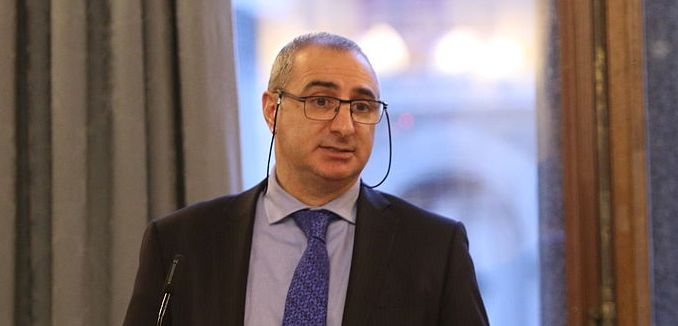Israel appointed a new ambassador to Turkey on Tuesday, filling a post that has been vacant since 2010.
Israel’s new envoy in Ankara will be Eitan Na’eh, who is currently deputy ambassador to the United Kingdom. Na’eh, who is considered an expert on Turkish affairs, worked as a diplomat in Turkey in the 1990s and later was ambassador to nearby Azerbaijan.
Na’eh’s appointment fulfills another step in the reconciliation deal that Israel reached with Turkey earlier this year. Turkey appointed Kemal Okem, a close advisor to President Recep Tayyip Erdogan, as ambassador to Israel last month.
Ties had been strained since the 2010 Mavi Marmara incident, when a flotilla under the control of the Turkish Humanitarian Relief Foundation—a group designated as a terror organization by the Netherlands and Germany—attempted to break Israel’s blockade of the Gaza Strip. IDF troops faced an “organized and violent” assault from a group of passengers after boarding the ship, according to a UN report. Ten crew members were killed in the ensuing fight, and several Israeli soldiers were injured.
After the reconciliation agreement was reached, Israeli leaders noted the significant economic potential of closer ties. “Trade between Israel and Turkey has more than doubled from the Marmara event up until today,” said Maj. Gen. (ret.) Yaakov Amidror, adding that the deal will bolster that growth with “joint projects in government level. People are speaking about gas and there are other issues that might emerge.”
Two other news events on Tuesday demonstrated Israeli diplomatic gains around the globe. In a meeting in New Delhi with Israeli President Reuven Rivlin, Indian Prime Minister Narendra Modi hailed the “strong and growing partnership” between their two nations in a number of fields, including defense, water, agriculture and education. And Israeli Prime Minister Benjamin Netanyahu announced that he would be visiting Fiji early next year, a nation that had not been previously visited by a sitting Israeli prime minister.
Ayoob Kara, Israel’s deputy minister of regional cooperation, said in August that “relations with our neighbors are the best they’ve ever been.” Israel recently opened a diplomatic mission in the United Arab Emirates, hosted Egypt’s foreign minister, and welcomed a high-level Saudi delegation.
Netanyahu visited Uganda, Kenya, Rwanda, and Ethiopia on a historic tour of East Africa in July. Weeks later, the Republic of Guinea, a Muslim-majority African nation, restored diplomatic ties with Israel after a 49-year break. Netanyahu has made it a priority to strengthen Israel’s commercial, diplomatic, and security relations with African countries. Israel has a long history of sharing its expertise on the continent, and Jerusalem hopes that increased ties with African nations will lead to a shift in their voting trends at the UN and other global fora, thus improving Israel’s diplomatic standing and reversing what Netanyahu called “the automatic majority against Israel.”
[Photo: Foreign and Commonwealth Office / WikiCommons ]




